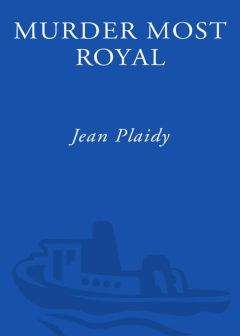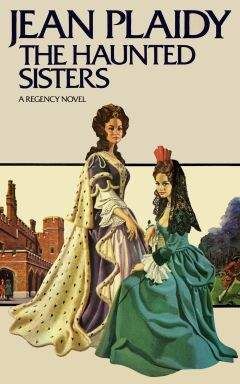Jean Plaidy - Murder Most Royal: The Story of Anne Boleyn and Catherine Howard
На сайте mybooks.club вы можете бесплатно читать книги онлайн без регистрации, включая Jean Plaidy - Murder Most Royal: The Story of Anne Boleyn and Catherine Howard. Жанр: Прочее издательство неизвестно,. Доступна полная версия книги с кратким содержанием для предварительного ознакомления, аннотацией (предисловием), рецензиями от других читателей и их экспертным мнением.
Кроме того, на сайте mybooks.club вы найдете множество новинок, которые стоит прочитать.

Jean Plaidy - Murder Most Royal: The Story of Anne Boleyn and Catherine Howard краткое содержание
Murder Most Royal: The Story of Anne Boleyn and Catherine Howard читать онлайн бесплатно
These were minor matters compared with the great issue which disturbed his conscience. God bless the Bishop of Tarbes, that ambassador who had the tact at this moment to question the legitimacy of the Princess Mary.
“’Twere a matter to make a war with France,” said Katharine hotly. “My daughter a bastard! Your daughter...”
“These matters are not for women’s wits,” said the King. “Wars are not made on such flimsy pretexts.”
“Flimsy!” she cried, her voice sharp with fear. Katharine was no fool; to the suppers given in her apartments there came the most learned of men, the more serious courtiers, men such as Sir Thomas More; she was more fastidious than the English ladies, and she had never tried to learn the English ways. She did not enjoy the blood sports so beloved by her husband. At first he had protested when she had told him that Spanish ladies did not follow the hawk and hound. But that was years ago; he thought it well now that she did not attend sporting displays, since he had no wish for her company. But there was that in her which must make him respect her, her calm dignity, her religious faith; and even now, when this great catastrophe threatened her, she had not shown publicly—apart from her melancholy, which was natural to her—that she knew what was afoot. But she was tenacious; she would fight, he knew, if not for herself for her daughter. Her piety would tell her that she fought for Henry as well as for herself, that divorce was wrong in the eyes of the Church, and she would fight with all her quiet persistence against it.
“Katharine,” said the King, “dost thou remember thy Bible?” He began to quote a passage from Leviticus wherein it was said that for a man to take his brother’s wife was an unclean thing, for thus had he uncovered his brother’s nakedness, they should therefore be childless. He repeated the last sentence.
“Thou knowest I was never truly thy brother’s wife.”
“It is a matter which perplexes me greatly.”
“You would say you believe me not?”
“I know not what to say. Your hopes of an heir have been blighted; it looks like Providence. Is it natural that our sons should die one after the other? Is it natural that our efforts should be frustrated?”
“Not all,” she said plaintively.
“A daughter!” he retorted contemptuously.
“She is a worthy girl....”
“Bah! A girl! What good are women on the throne of England! She is no answer to our prayers, Katharine. Sons have been denied to us. The fault does not lie in me...”
Tears were in the Queen’s eyes. She would hate this man if most of her natural instincts had not been suppressed by piety; she knew not now whether she hated or loved; she only knew she must do what was right according to her religion. She must not hate the King; she must not hate her husband; for therein was mortal sin. So all through the years when he had slighted her, humiliated her, shown utter carelessness of the hurt his lack of faith might cause her, she had assured herself that she loved him. Small wonder that he found her colorless; small wonder that now he compared this woman of forty-one with a laughing, willful girl of nineteen years! He was thirty-five; surely a good age for a man—his prime. But he must be watchful of the years, being a king who had so far failed to give his kingdom an heir.
A short while ago he had brought his illegitimate son to court, and heaped honors upon him to the deep humiliation of the Queen, whose fears were then chiefly for her daughter. This huge man cared nothing for her, little for her daughter; he only cared that he should get what he wanted, and that the world should think that in procuring his own needs he did it not for his own, but for duty’s sake.
When he said that the fault was not with him, he meant she had lied when she declared herself a virgin; he meant that she had lived with his brother as his wife. She began to weep as she prayed for strength to fight this powerful man and his evil intentions to displace her daughter from the throne with a bastard he might beget through one whom he would call his wife.
“Search your soul!” he said now, his voice trembling with righteousness. “Search your soul, Katharine, for the truth. Does the blame for this disaster to our kingdom lie with you or with me? I have a clear conscience. Ah, Katharine, can you say you have the same?”
“That I can,” she said, “and will!”
He could have struck her, but he calmed himself and said in melancholy fashion: “Nothing would have made me take this step, but that my conscience troubled me.”
She lay down and was silent; he lay down too; and in a very short while he had forgotten Katharine and was thinking of her who, he had determined, should be his.
Anne arrived at Hever with the words of the King’s song still in her thoughts. She found it difficult to analyze her feelings, for to be the object of so much attention from one as powerful as the King was to reflect that power; and to Anne, bold and eager for life, power, though perhaps not the most cherished gift life could bestow, was not to be despised.
She wondered what he would say when the news of her departure reached him. Would he be angry? Would he decide that it was beneath his dignity to pursue such an unappreciative female? Would he banish her from court? She fervently hoped not that, for she needed gaiety as she never had before. She could suppress her melancholy in feverish plans for the joust, and moreover her friends were at court—George and Thomas, Surrey and Francis Bryan; with them she could laugh and frivol; and indeed talk most seriously too, for they were all—perhaps with the exception of Surrey—interested in the new religion of which she had learned a good deal from Marguerite, now the Queen of Navarre. They leaned towards that religion, all of them, perhaps because they were young and eager to try anything that was different from the old way, liking it by virtue of its very novelty.
She had not been at Hever more than a day, when the King arrived. If she had any doubt of his intense feeling for her, she need have no doubt any longer. He was inclined to be angry, but at the sight of her his anger melted; he was humble, which was somehow touching in one in whom humility was such a rare virtue; he was eager and passionate, anxious that she should have no doubt of the nature of his feelings for her.
They walked in that garden which had been the scene of their first encounter; and that was at his wish, for he was a sentimental man when it pleased him to be so.
“I have seriously thought of this matter of love between us,” he told her. “I would have you know that I understand your feelings. I must know—so stricken am I in my love for you—what your feelings to me are, and what they would be if I no longer had a wife.”
She was startled. Dazzling possibilities had presented themselves. Herself a Queen! The intoxicating glory of power! The joy of snapping her fingers at the Cardinal! Queen of England...!
“My lord...” she stammered. “I fear I am stupid. I understand not...”
He put a hand on her arm, and she felt his fingers burning there; they crept up to her forearm, and she faced him, saw the intensity of his desire for her, and thrilled to it because, though he might not be a man she loved, he was King of England, and she felt his power, and she felt his need of her, and while he was in such urgent need it was she who held the power, for the King of England would be soft in her hands.
She cast down her eyes, fearful lest he should read her thoughts. He said she was fairer than any lady he had ever seen, and that he yearned to possess her, body and soul.
“Body and soul!” he repeated, his voice soft and humble, his eyes on her small neck, her slender body; and his voice slurred suddenly with desire as, in his mind, he took her, just as he had when he had lain beside the Queen and conjured up pictures of her so vividly that it had seemed she was there with him.
She was thinking of Percy and of Wyatt, and it seemed to her that these two mingled together and were one, representing love; and before her beckoned this strong, powerful, bejeweled man who represented ambition.
He was kissing her hand with swift, devouring kisses; there was a ring on her forefinger which she wore always; he kissed this ring, and asked that he might have it as a token, but she clenched her hands and shook her head. There was a large diamond on his finger that he would give to her, he said; and these two rings would be symbols of the love between them.
“For now I shall soon be free,” he said, “to take a wife.”
She lifted her eyes incredulously to his face. “Your Majesty cannot mean he would take me!”
He said passionately: “I will take none other!”
Then it was true; he was offering her marriage. He would lift her up to that lofty eminence on which now sat Queen Katharine, the daughter of a King and Queen. She, humble Anne Boleyn, was to be placed there...and higher, for Katharine might be Queen, but she had never had the King’s regard. It was too brilliant to be contemplated. It dazzled. It gave her a headache. She could not think clearly, and it seemed as though she saw Wyatt smiling at her, now mocking, now melancholy. It was too big a problem for a girl who was but nineteen and who, longing to be loved, had been grievously disappointed in her lovers.
“Come, Anne!” he said. “I swear you like me.”
“It is too much for me to contemplate....I need...”
“You need me to make up your mind for you!” he said, and there and then he had her in his arms, his lips hard and hot against her own. She felt his impatience, and sought to keep her wits. Already she knew something of this man; a man of deep needs ever impatient of their immediate gratification; now he was saying to her: “I’ve promised marriage. Why wait longer? Here! Now! Show your gratitude to your King and your trust in him, and believe that he will keep his promise!”
The Secret Matter...would it be granted? And if so...what would her old enemy, Wolsey, have to say of such a marriage? There would be powerful people at court who would exert all their might to prevent it. No, she might be falling in love with the thought of herself as Queen, but she was not in love with the King.
She said, with that haughty dignity which while it exasperated him never failed to subdue him: “Sire, the honor you do me is so great that I would fain...”
With a rough edge to his voice he interrupted: “Enough of such talk, sweetheart! Let us not talk as King and subject, but as man and woman.” One hand was at her throat. She felt his body hot against her own. With both hands she held him off.
“As yet,” she said coldly, “I am unsure.”
The veins stood out on his forehead.
“Unsure!” he roared. “Your King has said he loves you...aye, and will marry you, and you are unsure!”
“Your Majesty suggested we should talk as man and woman, not as King and subject.”
She had freed herself and was running towards the hedge of fir trees which enclosed this garden; he ran after her, and she allowed herself to be caught at the hedge. He held both her hands tightly in his.
“Anne!” he said. “Anne! Dost seek to plague me?”
She answered earnestly: “I never felt less like plaguing anyone, and why should I plague Your Majesty who has done me this great honor! You have offered me your love, which is to me the greatest honor, you being my King and I but a humble girl; but it was Your Majesty’s command that I should cease to think of you as King...”
He interrupted: “You twist my words, Anne. You clever little minx, you do!” And, forcing her against the hedge, he put his hands on her shoulders and kissed her lips; then those hands sought to pull apart her dress.
She wriggled free.
He said sternly: “I would have you regard me now as your King. I would have you be my obedient, loving little subject.”
She was breathless with fear. She said, greatly daring: “You could never win my love that way! I beg of you, release me.”
He did so, and she stood apart from him, her eyes flashing, her heart beating madly; for she greatly feared that he would force on her that which till now she had so cleverly avoided. But suddenly she saw her advantage, for there he stood before her, not an angry King but a humble man who, besides desiring her, loved her; and thus she knew that it was not for him to say what should be, but for herself to decide. Such knowledge was sweet; it calmed her sorely troubled mind, and calm she was indeed mistress of the situation. Here he was, this great bull of a man, for the first time in his life in love, and therefore inexperienced in this great emotion which swept over him, governing his actions, forcing him to take orders instead of giving them; forcing him to supplicate instead of demanding.
“Sweetheart...” he began hoarsely; but she lifted a hand.
“Your rough treatment has grieved me.”
“But my love for you...”
She looked at the red marks his hands had made on her shoulder, where he had torn the neck of her gown.
“It frightens me,” she said, looking not the least frightened, but mistress of herself and of him. “It makes me uncertain....”
“Have no uncertainty of me, darling! When I first met you I went back and said to Wolsey: ‘I have been discoursing with one who is worthy to wear a crown!’”
“And what said my lord Cardinal? He laughed in your face I dare swear!”
“Dost think he would dare!”
“There are many things my lord Cardinal might dare that others would not. He is an arrogant, ill-bred creature!”
“You wrong him, sweetheart...nor do we wish to speak of him. I beg of you, consider this matter in all seriousness, for I swear there is none that can make me happy but yourself.”
“But Your Majesty could not make me your Queen! I have said your mistress I would never be.”
Now he was eager, for his mind, which had weighed this point since she began to torment him, was now firmly made up.
“I swear,” he said, “I would never take another queen but that she was Anne Boleyn. Give me the ring, sweetheart, and take you this so that I may have peace in my mind.”
These were sweet words to her, but still she wavered. Love first; power second. Ah, she thought, could I but love this man!
“Your Grace must understand my need to think this matter over well.”
“Think it over, Anne? I ask you to be my Queen!”
“We do not discuss kings and queens,” she reproved him, and the reproof enchanted him. “This is a matter between a man and a woman. Would you then wish me to be your Queen and not to be wholly sure that I loved you more than a subject loves a king?”
This was disarming. Where was there a woman who could hesitate over such a matter! Where was one like her! In wit, in beauty, he had known she had no equal; but in virtue too she stood alone. She was priceless, for nothing he could give would buy her. He must win her love.
He was enchanted. This was delightful—for how could he doubt that she would love him! There was none who excelled as he did at the jousts; always he won—or almost always. His songs were admired more than Wyatt’s or Surrey’s even; and had he not earned the title of Defender of the Faith by his book against Luther! Could More have written such a book? No! He was a king among men in all senses of the words. Take away the throne tomorrow and he would still be king. In love...ah! He had but to look at a woman and she was ripe for him. So it had always been...except with Anne Boleyn. But she stood apart from others; she was different; that was why she should be his Queen.
Похожие книги на "Murder Most Royal: The Story of Anne Boleyn and Catherine Howard", Jean Plaidy
Jean Plaidy читать все книги автора по порядку
Jean Plaidy - все книги автора в одном месте читать по порядку полные версии на сайте онлайн библиотеки mybooks.club.




